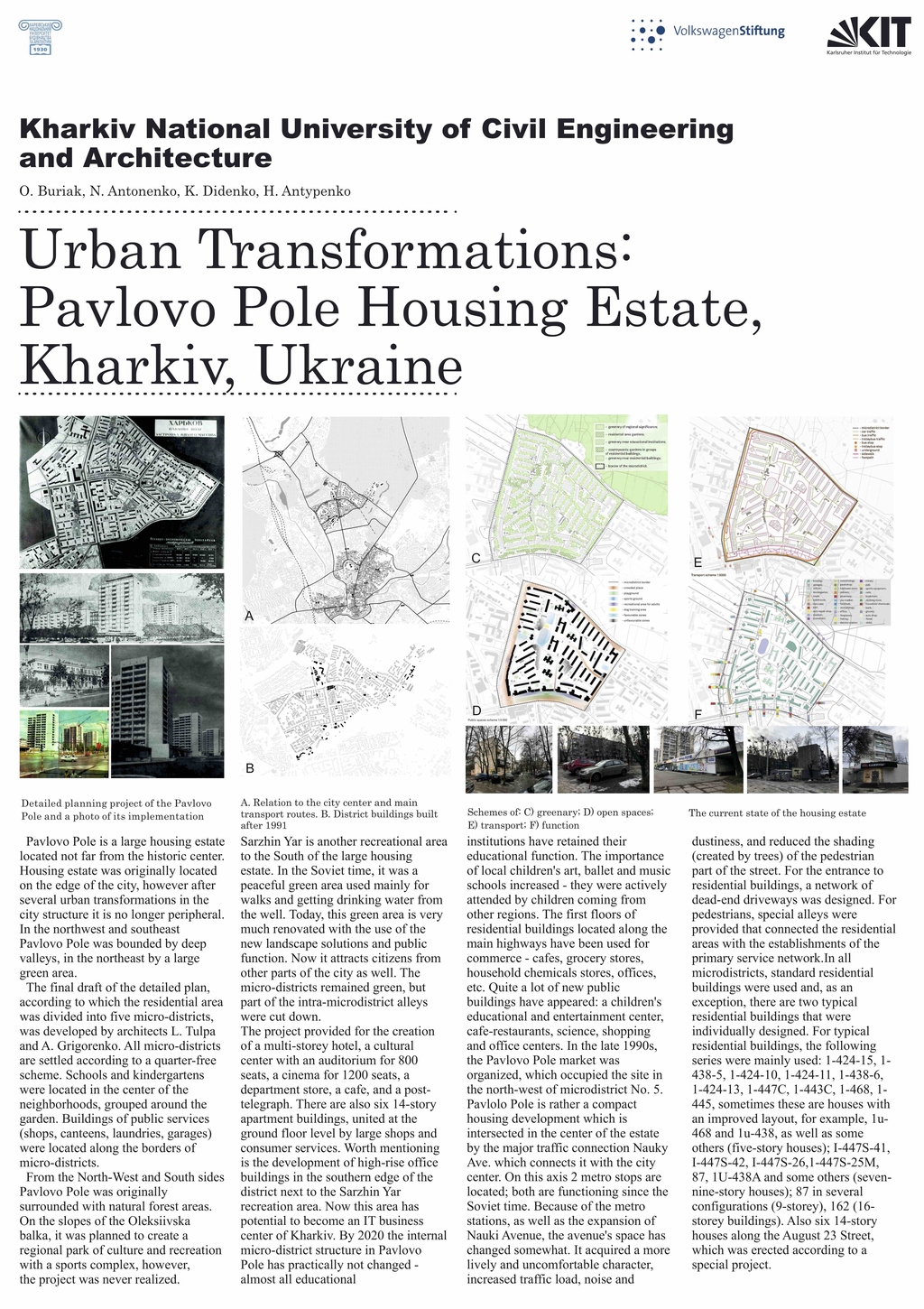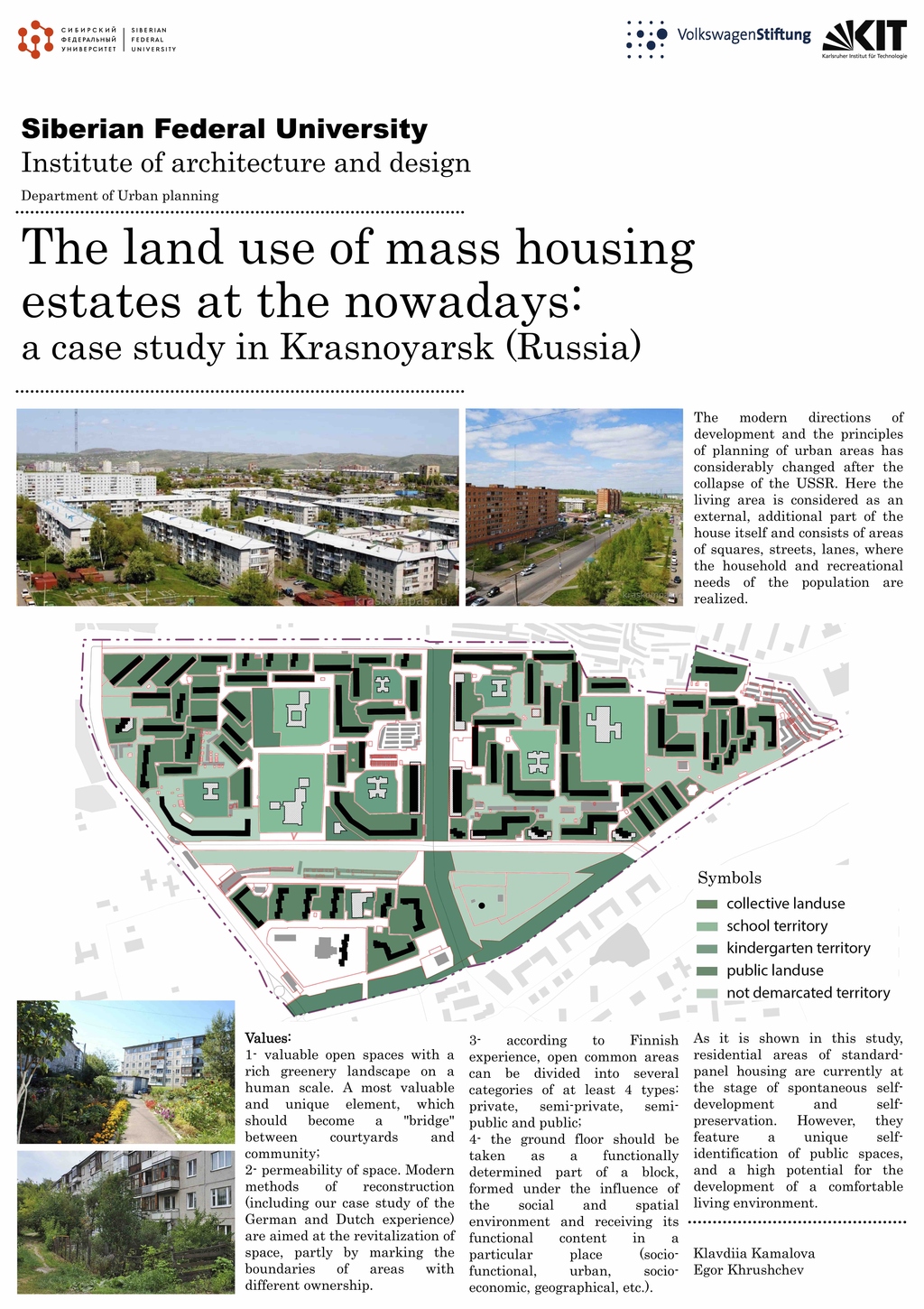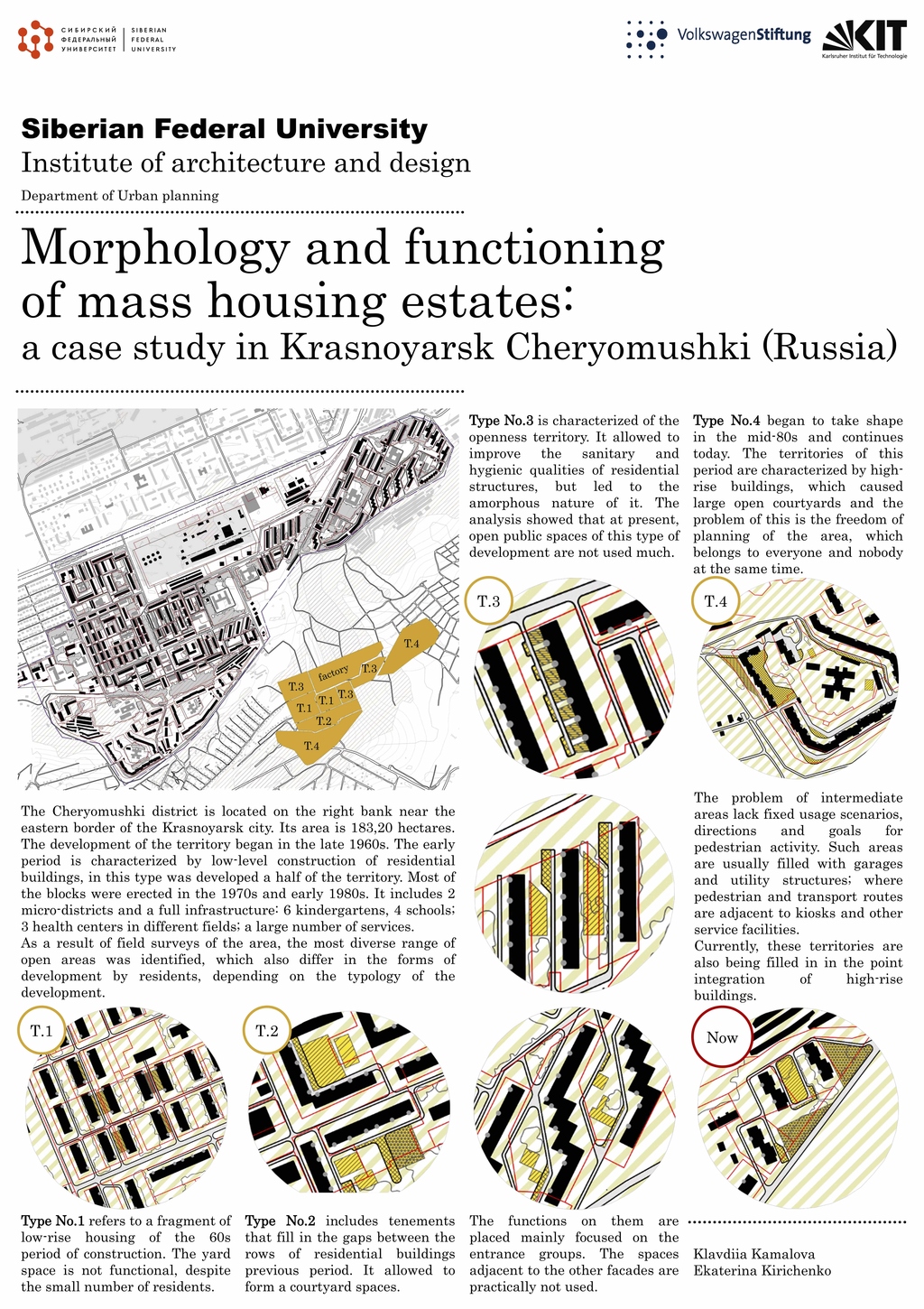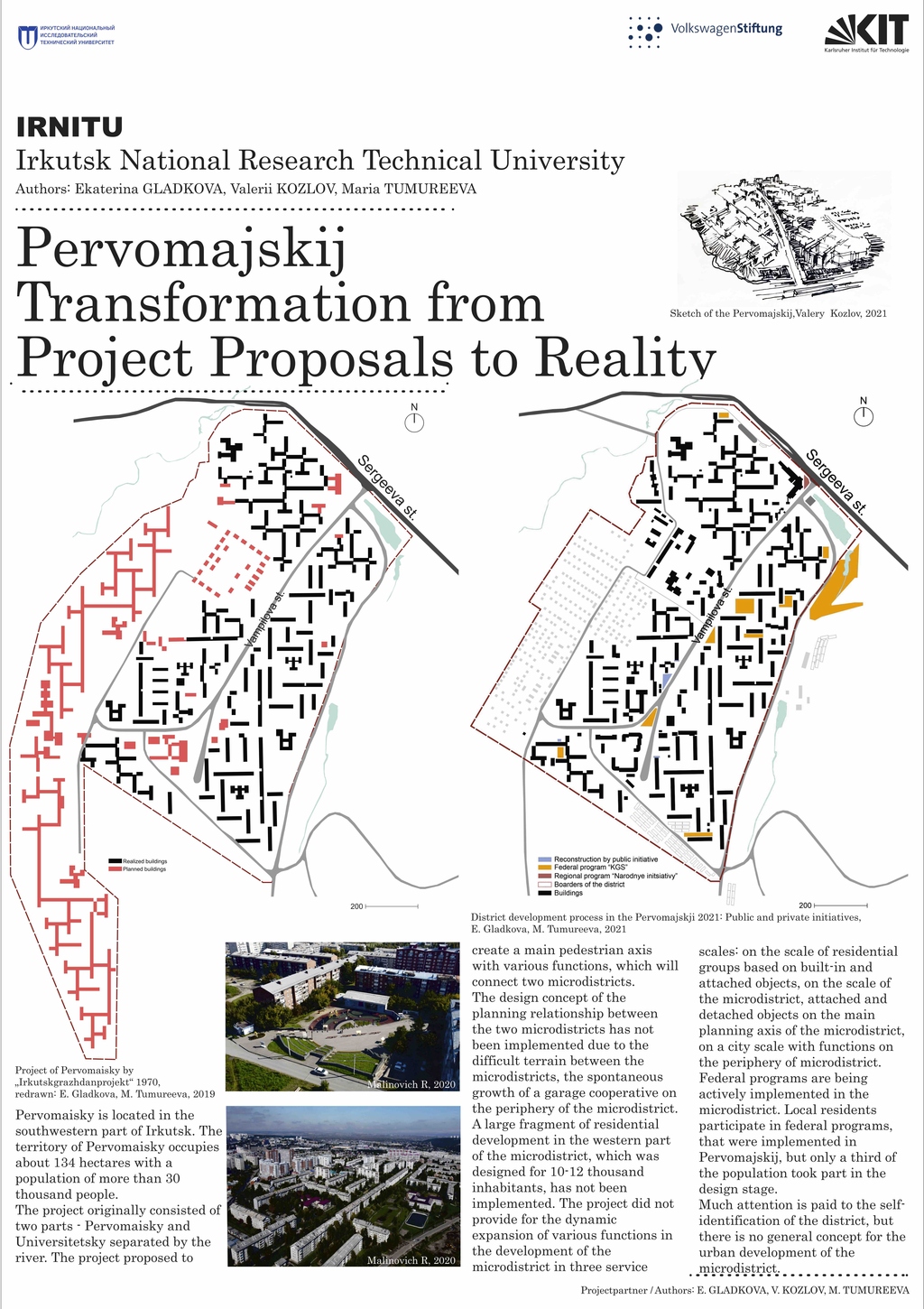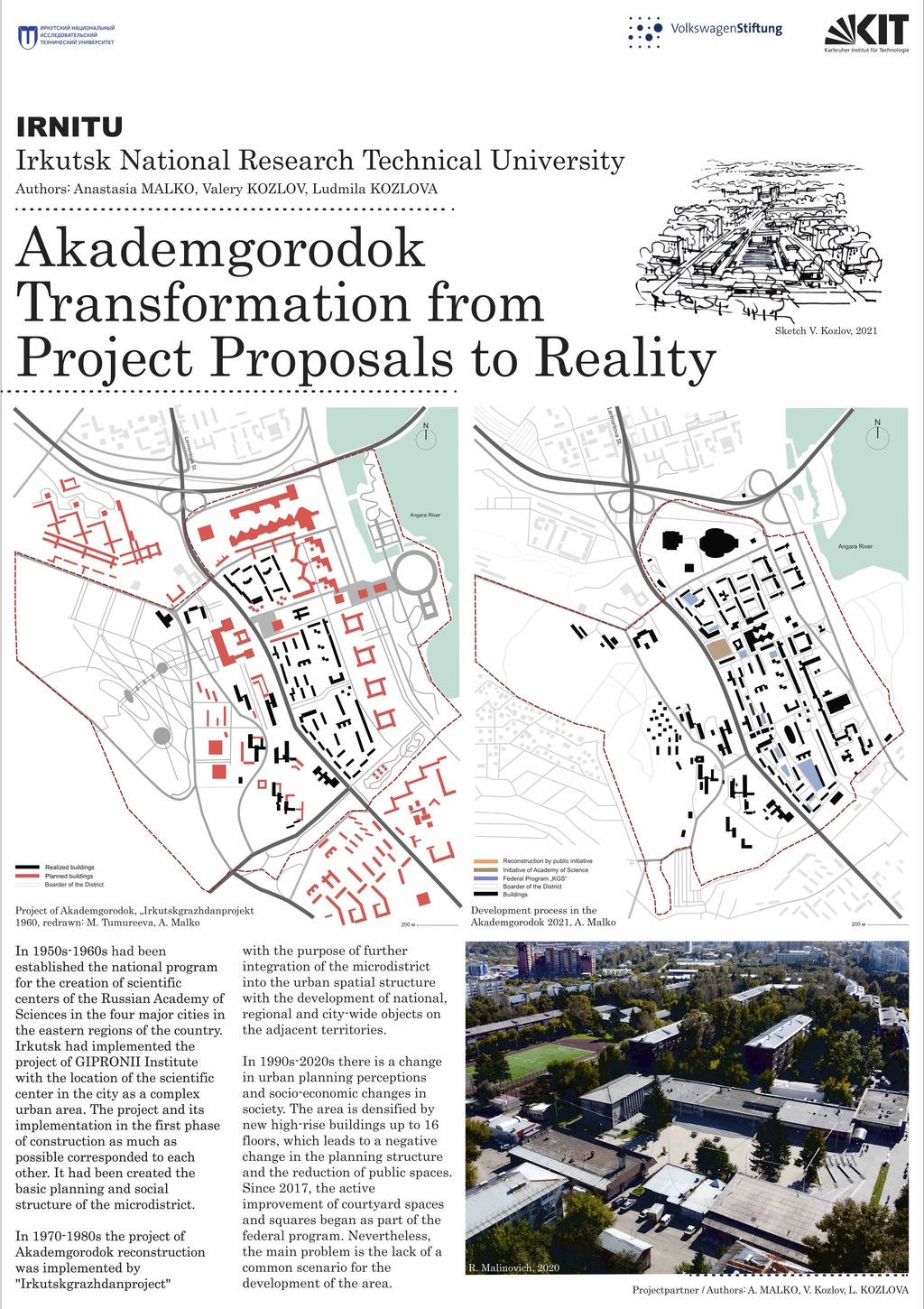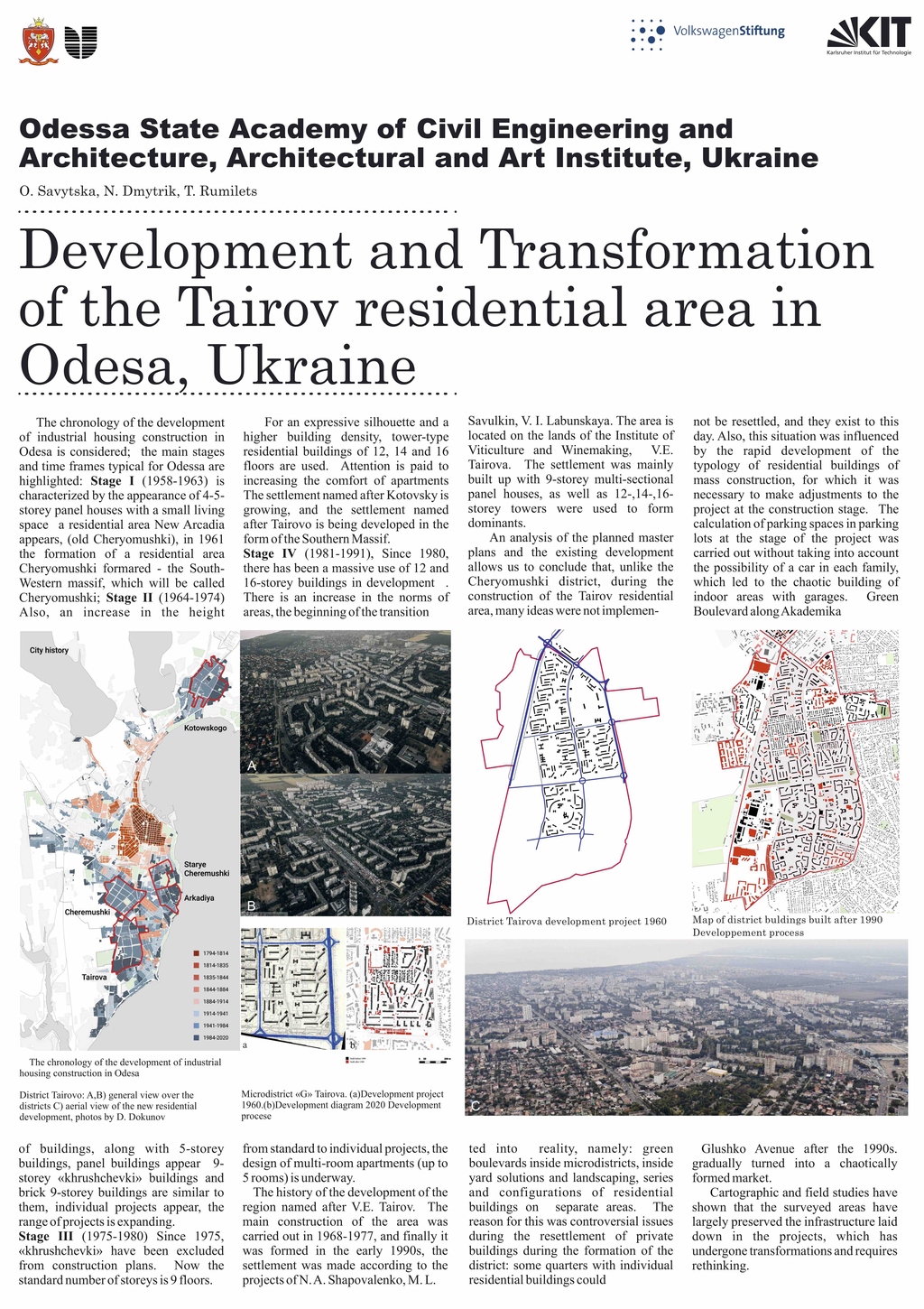The Conference “Dialogue on Large Housing Estates: Experiences and Perspectives on Housing” is the starting event of the second phase of an Russian-Ukrainian-German Research Project. It will discuss the topic of living in large housing estates from an interdisciplinary expert perspective. Speakers and those taking part in discussions will be experts and young academics from the disciplines of architecture and urban planning as well as open-space and transport planning, and from the housing and real estate sector as well as politics and the public administration. A total of nine key speakers is planned, three from Germany, three from Eastern Europe, and three from other countries. In addition young scientists will be selected for contribution to the conference by an open call. The constructional-spatial and design aspects of large housing estates will be looked at here – that is, the supply of dwelling typologies and technical aspects – and the socio-cultural, economic, and instrumental aspects will also be taken into focus. By evaluating international housing projects, the aim of the conference is to gain insights that can be used for the selected case studies in Russia and Ukraine.
The conference is free and open to the public. Virtual events hosted on Zoom Webinar do not require an account to attend, advanced registrations are encouraged.
To register please sent an email to Conference LargeHousingEstates ∂does-not-exist.iesl kit edu.
A link to the Zoom-Event will be sent to you before the conference.
The conference is recognized by the Chamber of Architects Baden-Württemberg as professional training for all disciplines, it is recognized for 8 hours of training.
Please indicate in the email if you need a certificate of attandence for the chamber of Architect.
Important Deadlines
16 Nov. 2020 – Call for papers open
31 Jan. 2021 – Deadline for abstract submission
10 Feb. 2021 – Notification of selected abstracts
15 Mar. 2021 – Registration opens
15 Mar. 2021 – Deadline for paper submission
15 Apr. 2021 – Final Conference programme
17 Apr. 2021 – Deadline for registration
The core program of the online conference will last for two days. With sessions in the morning and the afternoon on Friday and Saturday. The conference is part of the three year long trilateral research project „The future of modernist housing“ with participants from Russia and the Ukraine. All presentations will be consecutive and the discussion of each block simultan. While the audience can swith between discussion the panel will stay in the same room for the full hour. At the end of each block the topics will be further debated by the speakers in two seperate rounds and the floor will be open for questions. As part of each block young scientist both in their doctorate and post doctorate will have the chance to present their findings to the audience. Revised and excepted papers will be published in the conference proceedings.
Conference Day 1 Friday April 23rd
Session 1: Economy and Stakeholders
With the end of the Soviet Union, responsibility for urban development and housing construction was handed over to the municipalities and the market. Is the privatisation a chance or a threat for the transformation process? How could the municipality contribute to a social balanced development? How can private investment be managed and controlled in such a way that it contributes to the common good? In this session perspectives from academia and practitioners from Germany, Lithuania, Russia and Ukraine give insights in transformation procedures and their challenges.
Privatization vs. Responsibility of Municipality
Ruta Matoniene, Senior Adviser to the Chief Architect Vilnius City Municipality
The municipality in Vilnius has no legal preconditions to replace run-down apartment blocks by new modern construction due to private ownership of apartments and common areas of the house, same us land around the house. In Lithuania, the management of vacant undeveloped land has been transferred to a state institution and municipalities don’t have rights to build or renew engineering infrastructure around multi-dwellings until owners of dwellings rent land plot from the state. That causes serious delays and bureaucracy in complex renovation of housing estates, raise mistrust and feeling of ignorance.Which goals, actions, and organizations are in charge of the Lituanina Captial?
Housing in transition towards more energy efficiency and sustainability. The example of Latvia
Knut Höller, Executive Member of the Board, Eastern Europe Housing Initiative (IWO), Berlin
The report presents observations and projects from the perspective of the NGO IWO in housing and urban development in Eastern Europe – same goals and different challenges can be observed. The general background in Eastern Europe, with energy turnaround, efforts for energy efficiency in buildings and the situation of housing markets will be explained. Looking at the housing situation and perspectives in Latvia, decarbonisation of the building stock, the issue of affordable housing and the contribution and engagement of the IWO to energy efficiency in buildings and affordable housing will be discussed.
Property and Civil Society: De-colonizing Property Relationships in Post-Socialist Cities
Marianna Shkurko, Alexander Mikhaylov, HSE University, Graduate School of Urbanism
Exploring three critical cases, the transition of the standard neoliberal model of property and attempt to de-colonize the idea of property and its division in Russia is investigated. The case studies of Ulan-Ude, Vorkuta and Vladivostok are presented, where spatial characteristics and socio-economic situations resulted into the emergence of hybrid formats of property regimes.
Involvment of co-owners in building management
Petro Vykhopen, Former mayor of city of Zhovkva, Ukraine
Petro Vykhopen shares his experiences in addressing the issue of management and maintenance of apartment buildings. The report will present the efforts of the administration and specific path through energy saving and energy efficiency, reducing carbon emissions and a responsible attitude to the environment. The importance of the city's cooperation with the Ministry of Regional Development of Ukraine and the Eastern Committee of the German Economy, experts from the Berlin Competence Center and Delich, the implementation of energy saving projects under the European Union's Covenant of Mayors-East (CoM East) initiative with EU support, will be explained.
Session 2: Housing Typologies and Urban Environment
Large housing settlements consist of self-mirroring urban patterns, they are composed of a repetition of the same building, constructed of the same elements. The other characteristic feature and great asset are their green and open spaces – and problem at the same time, since often huge territories of greenery are abandoned or misused. How to transform the fabric of the large housing estates, adopting them to the new functional and technical needs without losing the specific character? The experts from Berlin, St. Petersburg, Buffalo and Weimar in this session will speak about the aesthetics of mass housing, the importance of public space and about the requirements for a sustainable rewnal.
The Aesthetics of Prefabrication: Towards a Typology of Soviet Mass Housing, 1955–1991
Prof. h.c. Dr.-Ing. Philip Meuser, Meuser Architects, Berlin
Soviet mass housing between 1955 and 1991 with more than 700 series types is a difficult and contradictionary issue. So far, the current research in building history has paid little attention to this relevant topic. Looking at different cities, from Moscow to Tashkent, he report appreciates one of the greatest building programs of post-war modernism. In addition to classifying mass housing construction in the architectural-historical context of Soviet modernism, ten parameters for a typology of mass housing will be presented.
Contemporary Perspectives on Innovations in post-World War II Housing Estates
Prof. Daniel Baldwin Hess, School of Architecture and Planning University at Buffalo
This presentation reviews the formation and socio-spatial trajectories of large housing estates in Europe, drawing upon case studies of housing estates in 14 European centers and detailed study of socialist-era housing in the Baltic countries (Estonia, Latvia, and Lithuania). The physical composition of housing estates is described in significant detail (including building materials; building form; architectural and landscape design; built environment characteristics; etc.). Various policies and planning initiatives have been implemented in order to prevent the social downgrading of housing estates, and these are reviewed in the presentation, along with policy measures that have been used to address challenges in housing estates throughout Europe. The post-World War II sentiment for ‘experimental living’ in planned housing can be translated to contemporary interest in sustainable housing types for the future.
Ecology of Materiality: Cases of Sustaining Large Housing Estates in Russia and Germany
Daria Volkova, Institute for European Urban Studies (IfEU) at Bauhaus University Weimar
Mass housing is one of the systems in sustaining which a lot of different actants with different perspectives are involved. The system of decision-making on a local level, national programs, repair funds, attitude towards energy-saving improvements, property regimes, states of the economy, climate peculiarities, even insects and mold – all of that reveals the complexity of how materiality changes under different actions, even if some of them could be treated as insignificant at the first glance.
Sustainable Redevelopment in Post-Soviet Cities
Gavriil Malyshev, MLA+, St. Petersburg
Redevelopment in post-soviet cities is an issue that requires new tools that would be suitable for work with the already existing housing rather than total demolition. MLA+ architectural bureau visions is that the densification, placing of new objects within the already built-up territories and spatial structuring of such territories may generate financial resources required for housing renewal. At the same time, new construction should improve the quality of the existing environment and not generate urban planning conflicts. To do so, the local community should be the main actor of the redevelopment process and our vision is to bring them resources (both financial and institutional) to organise it.
Conference Day 2 Saturday April 24th
Session 3: Citizens and Neighborhood
The population is becoming more and more diverse – in mass housing districts, too. How could the large estates respond to the existing (changing) demands? Large housing estates are often discussed as symbol of the failure of socialist policies. They were considered monotonous and depressing, the population was stigmatized and positive achievements were quickly forgotten. However, this image was by far not shared by all residents, after all for many people the apartments were their first home and the places where they grew up. The reports in this session discuss social phenomena of the prefabricated districts, e.g. as strategic plans to adopt them to the diverse needs of the population and the requirements for making them feel as “home”.
Recognizing Demografic Change in Large Housing Estates
Nilsson Samuelsson, Urban Planning Office, Municipality Dresden
The report reflects experiences of developing and executing urban strategies for large housing estates on the municipal administration level. In this process one crucial step is to apply general knowledge about “demographic change” without overseeing established characteristics of the specific neighborhood in terms of its location within the city, built structure, local history as well as its inhabitant’s social structures and active sub cultures. Too generalized strategies might generate unexpected social tensions or even disproportionate investments in the built structures. The fundamental challenge of demographic change is to make sure, that general knowledge based on statistics and scientific studies becomes an apparent and sustainable contribution for the specific neighborhood and its inhabitants as well as for the diverse city as a whole.
Perceptions and Constructed Marginality in Soviet and Post-Soviet Large Housing Estates: Case of Saint Petersburg, Russia
Ekaterina Korableva, Elvira Gizatilluina, Center for Applied Research, European University, Saint Petersburg
The report presents two case-studies of Large Housing Estates in Saint Petersburg. Both types of estates are targets of harsh criticism: khrushchevki are presented as dilapidated and unlivable environments while greenfields that mashroom around the city are being dubbed ‘new ghettos'. Paradoxically, one of the priority urban development tools the city has adopted is an urban regeneration program Renovatsiya that demolishes “depressing” khrushchevki and replace them with the criticised high-rises. Meanwhile, both types of estates are problematised from beyond: by experts, officials and media, not the residents themselves. In our paper, we shed light on the residents' perception of the life quality and the image of Saint Petersburgs Large housing estates.
Force the place attachment through its disruption - Ethnographic example in the Solidarita housing estate in Prague
Tereza Hodúlová, Charles University, Faculty of Humanities, Prague
This contribution shows how residents of the Solidarita housing estate in the Czech Republic are attached to the place of their home and neighborhood and how this attachment is reconceptualized through the socio-spatial changes of the place. Based on an ethnographic research, the report seeks to explore how these changes affect their everyday perception, understanding and experience of place.
Large Housing Estates: A Place to Call ‘Home’
Prof. PhD. Virág Molnár, Department of Sociology, The New School for Social Research
Understanding large housing estates as “home” requires a bottom-up approach that explores them from the natives’, i.e. the residents’, point of view. The first step towards appreciating large housing estates as places involves treating them as singular and unique rather than simply individual exemplars of the same generic housing type. Each estate is a historically specific configuration and needs to be understood in its distinct social, cultural and urban context. The shift of perspective also helps to shed some critical light on the role of architects, urban planners, sociologists, and policy makers. The presented examples surveyed in this analysis highlight key structural conditions and some small-scale interventions that have influenced a sense of home in large prefabricated housing estates.
Key Note: Reimaging Housing Estates and the Nexus of Planning and Policy
Prof. Sasha Tsenkova, PhD, University of Calgary
This keynote focuses on the future of post-war housing estates and provides a compelling rationale for the need to mobilise economic and social capital to reinvent these places into vibrant neighbourhoods. The issue is particularly critical for the post-socialist world of cities, where 53 million apartments in large housing estates are the home of 170 million people. These suburbs, planned according to modernist planning principles, were the flagship of socialist housing and planning policies.
The presentation has three main elements. First, it looks at the transition challenges affecting the housing estates. Housing reforms have proceeded with ‘trial and error’ promoting neoliberal policies of deregulation in housing finance, market-based access to housing and experimentation with fiscal programs promoting homeownership. Rates of homeownership over 85 percent, growing affordability problems, collapsing house prices by 30-70% since 2007, and mortgage defaults of 15-20% are signs of policy and market failure.
Second, it provides a compelling rationale for a more strategic investment in the housing estates and calls for policy and planning strategies to ensure quality of life. Shortage of economic capital, coupled with organisational and technical challenges, has led to physical deterioration, abandonment of essential social infrastructure and privatization of public spaces. Programs of retrofitting and energy efficiency upgrades have been challenged due to fiscal austerity. The residents in many cases have abandoned the formal systems instead of mobilising social capital to renew their assets. Finally, the presentation provides examples from neighbourhood improvement programs in Amsterdam, Manchester and Stockholm where strategic investment in diverse, socially cohesive and participatory projects sustains the vibrancy and vitality of housing estates making them resilient to crises and attractive places to live.
Conference Day 1 Friday April 23rd
08:30 am Registration
Zoom link open
09.00 am Introduction and Welcoming
Prof. Dr. Barbara Engel, Karlsruhe Institute of Technology, International Urbanism
Session 1 Economy and Stakeholders
09.30 am Privatization vs. Responsibility of Municipality
Ruta Matoniene, Deputy Director Urban Development Department Vilnius City Municipality
10.00 am Solutions for Cooperative Housing in Eastern Europe
Knut Höller, Executive Member of the Board, Eastern Europe Housing Initiative (IWO)
10.30 am Coffee Break
10.45 am Property and Civil Society: De-colonizing Property Relationships in Post-Socialist Cities
Marianna Shkurko, Alexander Mikhaylov, HSE University, Graduate School of Urbanism
11.30 am Involvement of co-owners in building management
Petro Vykhopen, Former Mayor of Zhovkva
Discussion Room 1
Petro Vykhopen, Knut Höller
Moderators: Nadezhda Antonenko / Bernd Hunger
Discussion Room 2
Ruta Matoniene, Marianna Shkurko, Alexander Mikhaylov
Moderators: Anastasia Malko / Melinda Benko
01 pm Lunch Break and Poster Exhibition
Session 2 Prefabrication, Industrialization
02.00 pm The Aesthetics of Prefabrication: Towards a Typology of Soviet Mass Housing, 1955–1991
Prof. h.c. Dr.-Ing. Philip Meuser, Meuser Architects, Berlin
02.30 pm Contemporary Perspectives on Innovations in post-World War II Housing Estates
Prof. Daniel Baldwin Hess, School of Architecture and Planning University at Buffalo
03.00 pm Coffee Break
03.15 pm Ecology of Materiality: Cases of Sustaining Large Housing Estates in Russia and Germany
Daria Volkova, Institute for European Urban Studies (IfEU) at Bauhaus University, Weimar
03.45 pm Additional Housing space – the urban living room
Gavriil Malyshev, Urban Analyst at MLA+, St. Petersburg
Discussion Room 1
Prof. Daniel Baldwin Hess, Yana Golubeva Moderators: Nikolas Rogge / Fedor Kudryavtzev
Discussion Room 2
Prof. h.c. Dr.-Ing. Philip Meuser, Daria Volkova Moderators: Anastasia Malko / Melinda Benko
Conference Day 2 Saturday April 24th
08.30 am Registration
Zoom link open
09.00 am Introduction and Welcome
Prof. Dr. Barbara Engel, KIT Karlsruhe
09.15 am Poster Introduction Pecha-Kucha
09.30 am Poster Sessions
Research Insights, presented by Project Members: Transformation processes of prefabricated settlements
Session 3 – Citizens and Neighborhood
11.00 am Challenge of Demographical Change
Nilsson Samuelsson, Urban Planning Office, Municipality Dresden
11.30 am Perceptions and constructed marginality in Soviet and post-Soviet Large Housing Estates: case of Saint Petersburg, Russia
Ekaterina Korableva, Elvira Gizatilluina, Center for Applied Research, European University, Saint Petersburg
12:00 pm Lunch Break and Poster Exhibition
02.00 pm Force the place attachment through its disruption - Ethnographic example in the Solidarita housing estate in Prague
Tereza Hodúlová, Charles University, Faculty of Humanities
02.30 pm Large Housing Estates: A Place to Call ‘Home’
Prof. PhD. Virág Molnár, Department of Sociology, The New School for Social Research, New York
Discussion Room 1
Tereza Hodúlová, Prof. PhD. Virág Molnár Moderators: Nikolas Rogge / Fedor Kudryavtzev
Discussion Room 2
Ekaterina Korableva, Elvira Gizatilluina, Nilsson Samuelsson Moderators: Nadezhda Antonenko / Bernd Hunger
05.00 pm Key Note A Place to Call Home: Reimaging Housing Estates and the Nexus of Planning and Policy
Sasha Tsenkova, University of Calgary
06.00 pm Discussion
Plenum
06.30 pm Closing remarks
Prof. Dr. Barbara Engel
Panel Discussion 1: Economy and Stakeholders
Room 1:
Petr Vykhopen, Knut Höller
Moderators: Nadezhda Antonenko / Bernd Hunger
Room 2:
Ruta Matoniene, Marianna Shkurko, Alexander Mikhaylov
Moderators: Anastasia Malko / Melinda Benko
Panel Discussion 2: Housing Typologies and Urban Environment
Room 1:
Prof. Daniel Baldwin Hess, Gavriil Malyshev
Moderators: Nikolas Rogge / Fedor Kudryavtzev
Room 2:
Prof. h. c. Dr.-Ing. Philip Meuser, Daria Volkova
Moderators: Anastasia Malko / Melinda Benko
Panel Discussion 3: Residents and neighbourhoods
Room 1:
Tereza Hodúlová, Prof. PhD. Virág Molnár
Moderators: Nikolas Rogge / Fedor Kudratzew
Room 2:
Ekaterina Korableva, Elvira Gizatilluina, Nilsson Samuelsson
Moderators: Nadezhda Antonenko / Bernd Hunger
In the six panel discussions we want to deepen the debate around the topics presented during the presentaions. The two tandems of speakers and moderators will dive into the details and the audience is encouraged to participate in the debate. You are free to swithc back and forward between the different rooms or stay with one topic for the entire hour.
The Pecha-Kucha presentation and the poster session will give all of you a brief insight into our current research. The presentation is supposed to give you a quick appetizer and afterwards you can choose the posters you are interested in. All Posters will be visible throughout the conferecne both here in the website as well as in an virtual room.


